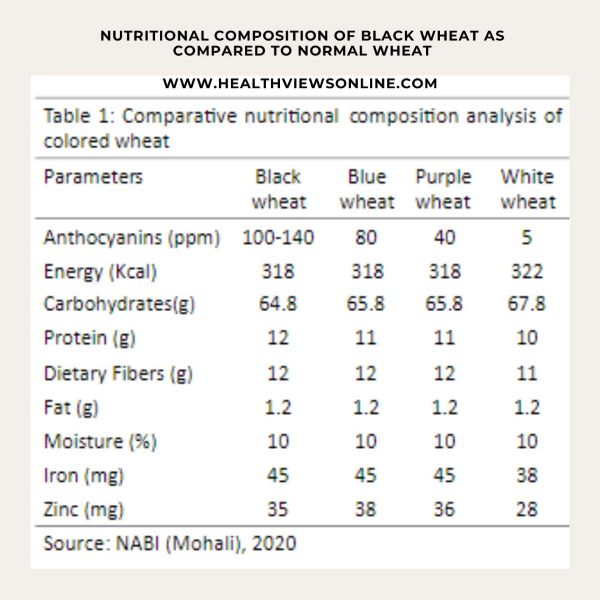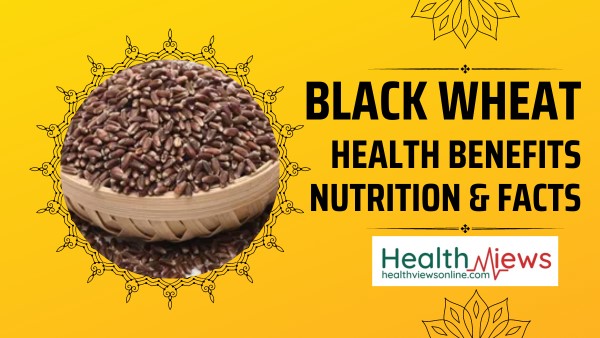Black wheat, a lesser-known variety of wheat, is making waves in the world of health and nutrition. With its distinctive dark color and exceptional nutritional profile, the black-colored grain is capturing the attention of health-conscious individuals. In this article, we explore what exactly this wheat is, delve into its impressive nutritional profile, and uncover the numerous health benefits it offers. Read on to discover the wonders of black wheat and why it deserves a place in your diet.
What is Black Wheat?
Black wheat (Triticum aestivum) is a unique variety of wheat that possesses a deep, dark color due to its high anthocyanin content. Anthocyanins are powerful antioxidants that give various fruits and vegetables their vibrant hues. While black-colored wheat shares some similarities with traditional wheat varieties, it stands out for its distinctive appearance and nutritional characteristics.
The concentration of anthocyanin determines the color of natural edibles. While regular wheat typically contains around 5 parts per million (ppm) of anthocyanin, black wheat has a significantly higher concentration of approximately 100-200 ppm (exact figures: 140 ppm). This elevated level of anthocyanin not only gives this wheat its dark color but also enhances its nutritional value, making it a scientifically healthier option.
This variety of wheat was introduced after years of research and development. It originated from the National Agro-food Biotechnology Institute (NABI) University in Mohali, Punjab, in 2017. The institute has recently obtained a patent for this unique variety of wheat.
Also Read: Wheatgrass Health Benefits, Nutrients, Therapeutic Uses & Side Effects
Nutritional Profile of Black Wheat:
Wheat (black) is a nutritional powerhouse, offering a range of essential nutrients and bioactive compounds that contribute to its health benefits. Here’s a glimpse into the impressive nutritional profile of black wheat:
- Fiber: This wheat is a rich source of dietary fiber, promoting healthy digestion and aiding in weight management.
- Protein: Like other wheat varieties, the grain contains proteins that are vital for muscle repair and growth.
- Vitamins: It is a good source of various vitamins, including B vitamins (such as niacin and thiamine) and vitamin E, which support overall well-being.
- Minerals: It provides essential minerals like iron, magnesium, and zinc, which are crucial for proper body functioning.
- Antioxidants: The dark color of this wheat is attributed to its high anthocyanin content. Anthocyanins act as potent antioxidants, protecting cells from damage caused by free radicals.
- Iron Content: This variety of wheat contains more iron than regular wheat. Iron is a crucial mineral that plays a vital role in various bodily functions, including oxygen transport, energy production, and immune system support. Incorporating black wheat into your diet can contribute to meeting your iron requirements and promoting overall health.
- Zinc Content: It boasts more zinc compared to regular wheat. Zinc is an essential mineral involved in numerous physiological processes, such as immune function, cell growth and repair, and enzyme activity. Including black wheat in your meals can help increase your zinc intake and support optimal health.
Nutritional Composition of Wheat – Black:
The nutritional composition of Black Wheat (Per 100g) is as follows on a dry weight basis: (Source: Pharma Journal)
- Moisture (g) 6.20±0.35
- Crude protein (g) 11.74±0.44
- Fat (g) 1.88±0.51
- Ash (g) 1.61±0.60
- Crude fiber (g) 9.86±0.42
- Carbohydrates (g) 69.53±0.29
- Energy (kcal) 342.64±4.07
- Iron 41.85±0.13
- Calcium 46.66±1.15
- Phosphorus 322.19±0.02

Health Benefits of Black-Coloured Wheat:
- Antioxidant Power: The anthocyanins in this wheat possess strong antioxidant properties that help combat oxidative stress, reduce inflammation, and protect against chronic diseases like heart disease and certain cancers.
- Digestive Health: The fiber content of this wheat promotes regular bowel movements, aids in maintaining a healthy gut microbiome, and may help prevent digestive issues such as constipation.
- Heart Health: Black wheat’s fiber and antioxidant content contribute to heart health by helping to regulate cholesterol levels, reducing the risk of cardiovascular diseases.
- Weight Management: The fiber in this wheat promotes satiety, helping you feel fuller for longer, which can aid in weight management and prevent overeating.
- Blood Sugar Control: The fiber and antioxidants may assist in managing blood sugar levels, making it a potentially beneficial grain for individuals with diabetes or those at risk of developing the condition.
Incorporating Wheat (Black) into Your Diet
To enjoy the health benefits of this wheat, you can incorporate it into your diet in various ways:
- Substitute black flour for traditional wheat flour in baking recipes to add a nutty flavor and a touch of natural darkness.
- Mix it into salads, soups, or stews to enhance both the visual appeal and the nutritional content of your meals.
- Experiment with black wheat pasta or noodles as a healthier alternative to traditional wheat-based options.
Also Read: Health Benefits of Millet for People With Various Health Diseases
Black wheat is an extraordinary grain that offers unique nutritional benefits and an array of health-promoting properties. With its impressive antioxidant content, fiber-rich nature, and contributions to heart and digestive health, this wheat variety deserves attention as a valuable addition to a balanced diet. Embrace the power of this wheat and explore its potential for a healthier and more vibrant life.





